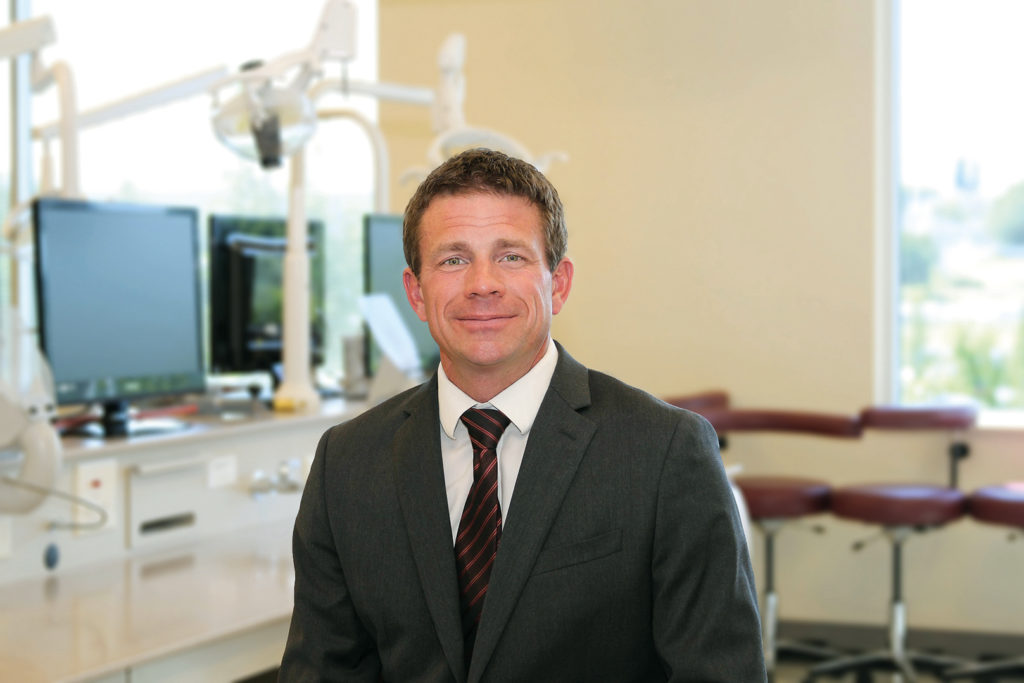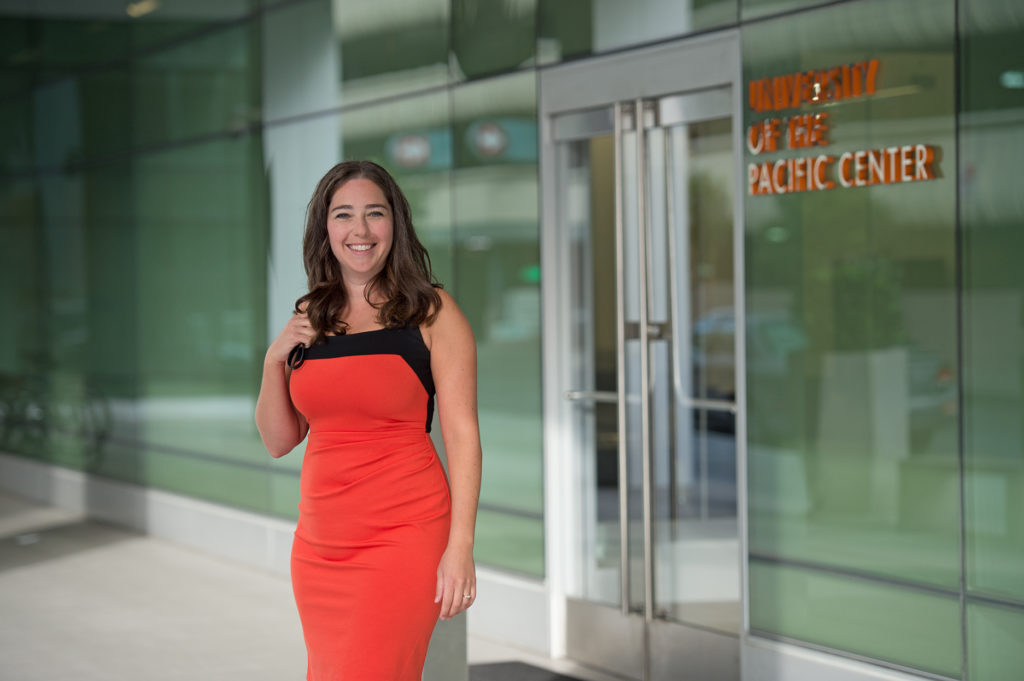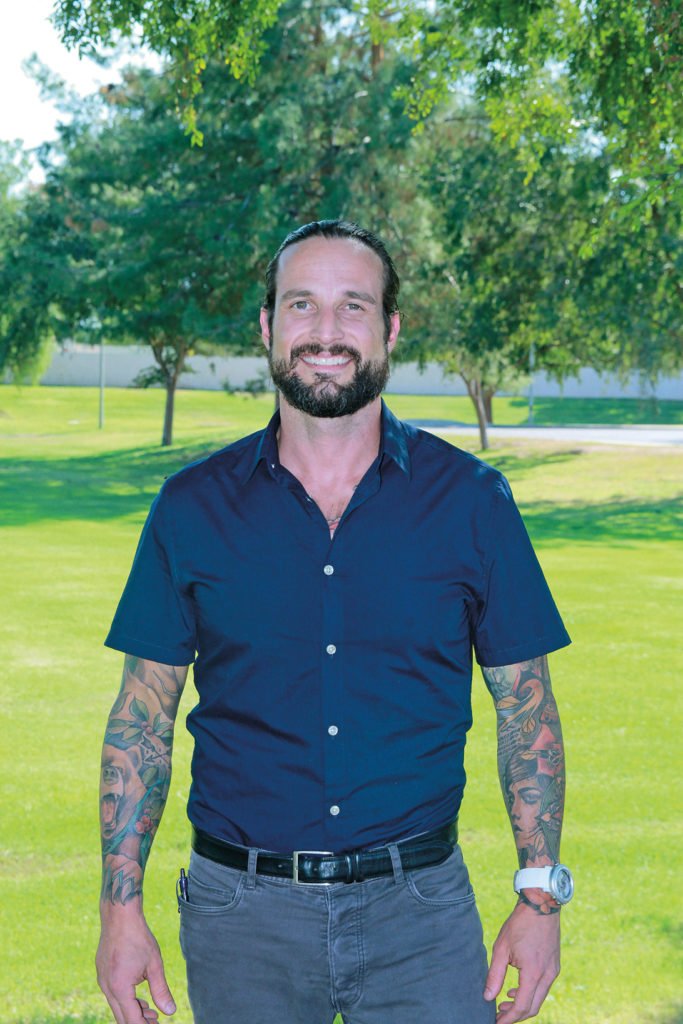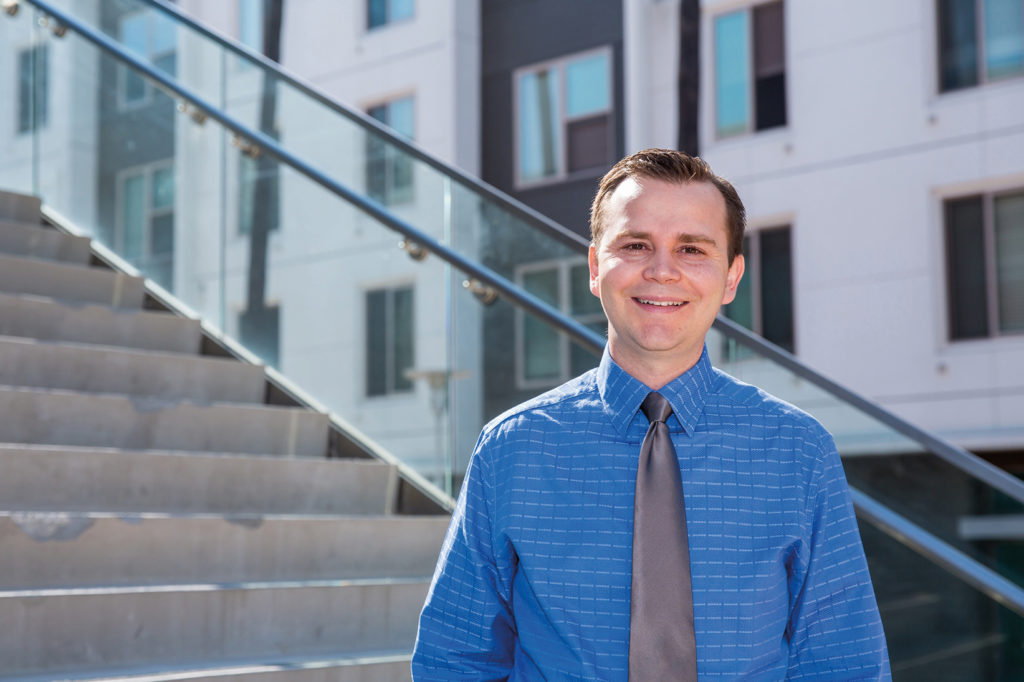Teaching. It’s something many dental students imagine themselves doing, especially when they’re learning their skills under great dental educators. But for most students and young dental school graduates, teaching is something they think they’ll do someday, at a time far in the future after they’ve established other careers. The four young alumni here, though, are on a different path. For a variety of reasons, they have become full-time dental educators, and they love it.
Building a Dental Program from Scratch
For Dr. Clark Dana ’03, ’15 Benerd School of Education, the pull of teaching was there from the time he started as a student at the Arthur A. Dugoni School of Dentistry. “I loved my dental school experience and decided early on that I would someday teach,” says the 43-year-old Dana.
He went into private practice after graduating, and in 12 years he built up two different practices, one in Utah and one in a small, underserved town in Wyoming. Then he heard that Roseman University of Health Sciences would open Utah’s first dental school in South Jordan. It was an opportunity to be part of building a dental education program from scratch. “I made a call, and I was able to begin work at a new dental school and help create what we are today,” he says.
Dana was asked to direct the dental anatomy course, and as a new teacher at a new school, he was, in his words, “scrambling to figure things out.” He reached out to Dr. Nader Nadershahi ’94, his group practice administrator when he was a dental student, for advice, and he learned about the master’s degree in dental education program offered jointly through the Academy for Academic Leadership and Pacific’s Gladys L. Benerd School of Education. “The degree program was perfect for me,” says Dana. “I was taking the course while preparing and teaching my own courses and was able to integrate what I was learning. I was a sponge!”
[pullquote]“The degree program was perfect for me.”
–Dr. Dana Clark ’03, ’15 EDU[/pullquote]
Dana’s role at Roseman is now director of preclinical education, and he says that his humanistic experience at the Dugoni School of Dentistry has been influential in guiding the educational direction of his program. He explains, “Our team has worked hard to put the patient at the center of every teaching experience. We value evidence-based decision making and critical thinking. We want our students to become diagnosticians, to be prepared to adapt to a changing profession. We ask ourselves, ‘What do these students need to know to be successful now… and in 20 years?’”
Dana has discovered not only the joy of teaching others but the satisfaction of adding to his own skill set. “Once I finished my master’s degree, I was hungry for more learning, and I’m now working on my PhD in discipline-based educational research at BYU.”
In building a new dental program, Dana has drawn on what he loves best about dentistry. “We get to influence the lives of others. From practicing in an underserved area—which I did as a clinician—to guiding students in their learning, we’re needed. It’s incredibly fulfilling,” he says.
Playing to Her Strengths
Dr. Civon Gewelber ’12 has known she wanted to teach since she was in high school and encountered some fabulous and inspiring educators. “I tended to be good at the subjects taught by my favorite teachers, which made me realize how important teachers are in influencing students’ attitudes and outcomes.”
The desire to teach and to work with her hands meant that a career in dental education was a great fit for Gewelber, but first, she spent many years enjoying being a student herself. After earning her undergraduate degree, she entered a three-year, pre-medical, post-baccalaureate program, followed by dental school and a year of residency. It was during her residency at University of Nevada, Las Vegas (UNLV) that she was offered a part-time position after graduation to get a taste for teaching before applying for a full-time position.
“I knew I didn’t want to own a dental practice, and I absolutely loved being in the clinic with students,” says the 32-year-old Gewelber. “I have never regretted the decision to stay and pursue a full-time position.”
She still remembers giving her first lecture, on gingiva and tooth supporting structures. “I was very nervous, but the first-year dental students were so supportive and applauded at the end. I’ve been hooked ever since.”
[pullquote]“I knew I didn’t want to own a dental practice, and I absolutely loved being in the clinic with students.”
–Dr. Civon Gewelber ’12[/pullquote]
Among the many faculty members at the Dugoni School of Dentistry who inspired Gewelber along her journey from dental student to professor, Dr. Mark Booth ’01 stands out. “I had previously thought that you needed at least a few years of private practice experience before being qualified to teach, but Dr. Booth made me realize that everyone has something to offer and even without years of experience I could still influence students in a positive way and help them develop a good foundation for a successful career.”
One way Gewelber influences students is in her role as the director of UNLV’s newly formed Special Care Dental Clinic, where, now as a full-time assistant professor, she teaches students about treating adult patients with disabilities. Encouragement she received from Dr. Paul Subar during her Dugoni School of Dentistry rotation with special needs patients was critical to her having the confidence to accept this challenging appointment. “He told me that I was good with the patients and should consider looking into hospital dentistry as a career. At the time I didn’t think much of it, but when my current position became available I remembered Dr. Subar’s comments and thought, ‘I can do this!’”
“I am so thankful to everyone at the Dugoni School for giving me a strong foundation and encouragement to pursue an academic career at a young age.”
While she admits to being surprised about the year-round nature of teaching, with sometimes long hours to grade papers, mentor students and continue her own professional development, Gewelber says she loves her work. “Teaching is a good fit for me, bottom line. I feel like I’m making a difference.”
An Accidental Educator
Dr. Eric Harris ’03 spent the first six years after graduating from the Dugoni School of Dentistry establishing two private dental practices and participating in several overseas trips providing dental care to underserved populations before transitioning to academia by accident. Literally.
In 2009, Harris crashed his motorcycle while traveling 80 miles per hour. He broke 16 bones in his hands, wrists and spine, and his right hand had to be surgically rebuilt. “When I woke up in the hospital a week after the accident, my first thought was ‘Oh no! I can’t be a dentist anymore!’” the 39-year-old Harris recalls. “But I quickly regained a profound sense of gratitude and a determination to appreciate every moment of my life. I was optimistic about pursuing a career doing other things I enjoyed.”
He eventually accepted a teaching position at A.T. Still University, Arizona School of Dentistry and Oral Health in Mesa, Arizona. He is now clinical director of community partnerships and assistant professor of clinical dentistry, teaching a simulation lab module on CAD/CAM and technology-assisted dentistry, clinical CEREC dentistry and clinical photography. He also serves as an adjunct professor at A.T. Still’s Missouri campus, teaching the same lab and photography courses, and he spends one day a month as an adjunct professor for several AEGD residency programs. Harris is also clinical director for a free dental clinic embedded in a local Title 1 elementary school.
[pullquote]“I love dentistry, and I am proud to have learned my craft from the best.”
–Dr. Eric Harris ’03[/pullquote]
Harris is passionate about volunteering and has provided dental care to patients around the world. He co-founded Bright Island Outreach, an organization that takes 25-75 dental students from several U.S. universities on six expeditions per year. During a recent expedition, volunteers treated 461 patients in four days. They provided more than 800 extractions, 500 fillings, 89 root canals and 56 dentures. Students on these trips learn more than just clinical skills, says Harris. “They learn time management, encouraged by the 400 patients standing outside waiting their turn, and they develop an appreciation for participating in outreach dentistry throughout their careers, whether on expeditions like ours or in their own neighborhoods and communities.”
The accident that led to his teaching career now feels like an opportunity to Harris. “I love dentistry, and I am proud to have learned my craft from the best,” he says. “But when people ask me what I do for a living, I tell them I am a teacher. It’s wonderful to teach something I love to students who are eager to learn it.”
A Career that Fits
Looking back, Dr. Keith Boyer ’08 says his teaching career started during his second year at the Dugoni School of Dentistry, when he helped out friends in the first-year class after hours in the sim lab. Now the 32-year-old endodontist finds that full-time teaching fits his family’s life and offers him the chance to inspire dental students with the same passion he has for treating patients.
After Boyer finished dental school, he completed an endodontic residency at University of Pennsylvania, then began working in private practice, first in Pennsylvania and then in California, while also teaching part-time. In 2013, he applied to teach endodontics at Western University of Health Sciences (WesternU) in Pomona, California.
“At first, I maintained a practice on the side, but I found the time spent at school to be so much more rewarding,” said Boyer. “So, I dropped private practice and only see patients in faculty practice now.”
In teaching students to care for patients, Boyer relies on a familiar example. “I try to model high clinical standards and empathy just like my instructors did at the Dugoni School,” he says. Several dental school faculty members were influential in Boyer’s own educational development, including Dr. Alan Gluskin ’72, who spurred Boyer’s interest in endodontics and gave him the opportunity to teach in the pre-clinical endodontics module. Moreover, the humanistic teaching model from the Dugoni School of Dentistry is one, according to Boyer, that has been replicated at WesternU, the newest dental school in California. “It was an easy transition for me to teach here. Because my educational experience at the Dugoni School was so good, I try to deliver the same experience for my students.”
[pullquote]“At first, I maintained a practice on the side, but I found the time spent at school to be so much more rewarding.”
–Dr. Keith Boyer ’08[/pullquote]
Being a full-time educator has additional benefits. Boyer notes that working for a non-profit institution offers opportunities for student loan repayment and forgiveness. And, the educational schedule fits well with family life. His wife, Dr. Jamie Parado ’09, is also a faculty member at WesternU, and although Boyer still works long hours, when he’s off he can really focus on his family. “When our daughter was born, I was able to take a full six weeks of family leave to bond with her and help my wife, something I would never be able to do in private practice.”
As a dental educator, Boyer prepares future dentists by teaching them what he loves most about the field. “Dentistry, especially endodontics, is both an art and a science. We can use our knowledge of disease processes, anatomy and physiology and apply that knowledge to help heal patients and relieve them of pain.”
Jennifer Langham is a contributor to Contact Point and other University of the Pacific publications.

Dr. Dana Clark ’03, ’15 EDU 
Dr. Civon Gewelber ’12 
Dr. Eric Harris ’03 
Dr. Keith Boyer ’08